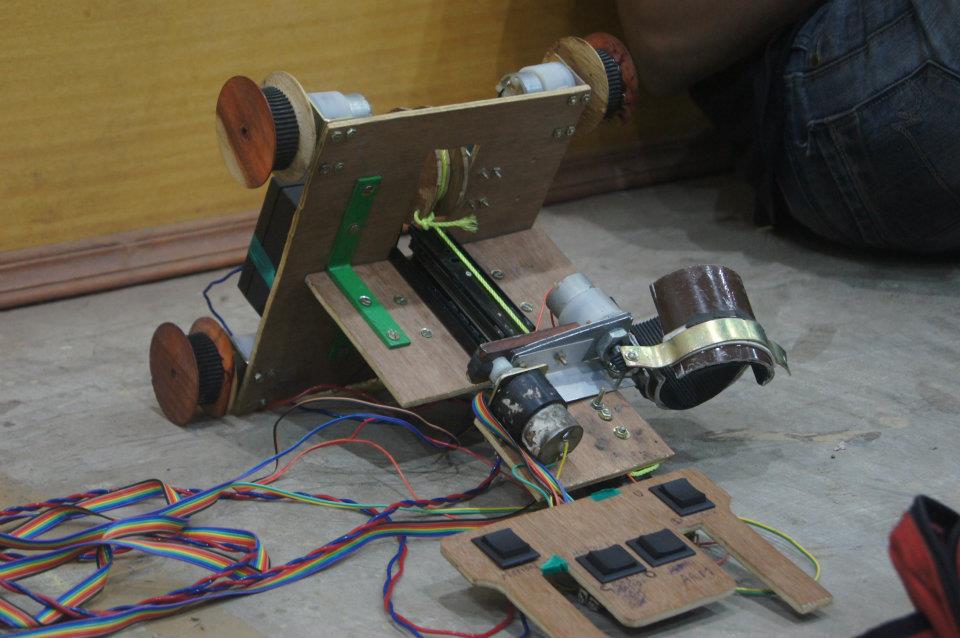
Every year, he looks at these candidates, and smirks at them, thinking they’re up to no good. He finds flaws in their points, questions their motives, and ridicules them in his mind. Nothing much has changed this year. Same positions, same procedures, same old politics; only the faces are different. That night, lost in introspection, he wondered what drove those people and their friends to spend so much energy into electorial ventures. He wondered how it feels to be an aspiring secretary, his perception being fogged by prejudice. The only way he could get a clear picture was by being a candidate himself.
So he decided to stand for the election, posing as a serious candidate just to experience the highs and lows of the process, to see how things work behind the scenes, to study the mindsets of the people involved. A little bit of election spam for the sake of infotainment.
“Northie, Telugu, or Tam candidate?
None, sir, I am a spam candidate.”
He chose to contest for Hostel Affairs Secretary (HAS) – a position that doesn’t really figure in many people’s dreams. “There’s nothing to lose”, he felt. At best, he’d win the election and try to bring the change he always wanted to see around him. Otherwise, he’d be humiliated by defeat, but then he’d learn a lot in the process anyway.
Without wasting much time, he began this little experiment. He started approaching people for their feedback about the state of affairs in the institute. In simpler words, he started campaigning by making his presence felt. He smiled at every person he knows even remotely, befriended strangers on Facebook, and toned down his (allegedly) temperamental behavior.
Looking at people’s reactions, he could pick up some clear trends – friends would encourage him a bit too much and foes try to show him that he doesn’t stand a chance. Strangers would say that they’d vote for the best manifesto, which implies, euphemistally: “I don’t know you, I won’t vote for you.” Close friends were a different problem altogether – they saw through everything, and asked him to stop kidding about the candidature. Then, there were ubiquitous enthu-juniors, who were so happy they started hugging him, with promises of tremendous campaign support.
To make his manifesto, he starts reading the institute constitution from the students’ portal. It did not help much. He got hold of previous manifestos, scanned them for interesting points, and built on them. He met some people who could tell him what a HAS had to do. Gradually, as he learnt more, he realized how difficult the job was. In fact, it was a thankless one. Monitoring shrewd caterers, meeting quality standards three times a day throughout the semester, dealing with huge number of complaints and criticism without any appreciation for any of the effort put in – and most importantly, keeping one’s cool in such adverse conditions – it was all part of the work. He remembered all the times he cursed the HAS and his team for being inefficient. He now respected the HAS more than any other secretary.
As he retired to sleep after a day of exhaustive running-around, he heard people outside in the corridor discussing the elections. The status of various Cul-sec candidates was all they talked about. It appeared to him that Saarang mattered more to most students than the state of their own mess. “Why do we need two Cul-secs, when they put in much lesser work than one HAS? Surely, people can live without a fest, but not without proper food and facilities. To them, the gen-sec and HAS candidates should matter more – these are the people who will actually improve hostel life, and who need to be chosen with utmost scrutiny.” A t that moment, he decided to step down; having had enough of fooling around. There were good lessons to be learnt from the misadventure, but that’s as far as it would go.
Of course, the subject didn’t really close there. The embarrassment that followed, the guilt of letting down all the people who had started secretly campaigning for him, and the same annoying question everyone asked him, over and over again; they left him upset. But he snapped out of it. It was, after all, an elaborate joke, but even so, the joke ended up changing his outlook; one could say it made him serious. It was a soul cleansing experience, totally worth all the bother.
And yes, he still does smirk at all the people who keep their eyes fixed on the Cul-sec elections, and those in the votebanks who baselessly blame their secretaries for all their problems. A great man once said that an ignorant democracy is worse than a dictatorship.
(If you are curious to know, he quietly withdrew his candidature in the morning, without telling anyone. Later in the afternoon, a senior goes running to his room and says, “Dude, please withdraw. It’s affecting our Cul-sec candidate.”)
Editor’s Note: It has been generally acknowledged that the author’s perceptions may have been substantially different if he had sat for Cul-Sec instead.
The views expressed in this article are those of the author and do not necessarily represent the views of, and should not be attributed to, The Fifth Estate or IIT Madras. For specific queries and feedback, leave a message or mail us at t5e.iitm[at]gmail.com.



